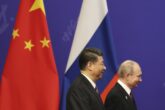February 10, 2020
Digital Authoritarianism: Finding Our Way out of the Darkness
From Chinese government surveillance in Hong Kong and Xinjiang to Russia’s sovereign internet law and concerns about foreign operatives hacking the 2020 elections, digital technologies are changing global politics — and the United States is not ready to compete. As a first step, U.S. government officials need to understand how authoritarian regimes are using these tools to control their populations and disrupt democratic societies around the world. To this end, Bridging the Gap and the Center for a New American Security brought together a community of researchers and policymakers to address these questions. Participants included experts from Congress, the State Department, the National Security Council, and elsewhere in the U.S. government and the broader policy community, as well as outside scholars who prepared research-based memoranda for discussion. This introductory article kicks off a short series on this important topic that includes articles adapted from a selection of these memos.
While democrats once believed that innovations in information and communications technology and data analysis would promote more open societies, the actual effects of these tools have been mixed. Authoritarians are using technology to deepen their grip internally, spread propaganda, undermine basic human rights, promote illiberal practices beyond their borders, and erode public trust in open societies. Today, Russia continues its campaign of cyber and information attacks against democratic institutions and social cohesion in the United States and Europe. Iran and North Korea are following suit. The Chinese Communist Party is forging a future of mass surveillance and “social credit” scores, and rapidly exporting those tools to other parts of the world. Autocratic governments seem to be outpacing free societies in harnessing new technologies to advance their political goals.
Read the full article in War on the Rocks.
More from CNAS
-
Republicans Saved Democracy Once. Will They Do It Again?
Despite different political and historical contexts, the playbook these personalist leaders use to dismantle democracy has been identical....
By Andrea Kendall-Taylor, Joseph Wright & Erica Frantz
-
Exploiting Russian Weakness
Introduction Russia’s full-scale invasion of Ukraine has created ripple effects that extend well beyond Ukraine’s borders. Reverberations from the war have been particularly p...
By Nicholas Lokker & Andrea Kendall-Taylor
-
How Personalist Politics is Changing Democracies
This rapid increase is alarming: Personalist rule brings with it a host of negative outcomes compared to other types of authoritarian systems....
By Andrea Kendall-Taylor, Carisa Nietsche, Erica Frantz & Joseph Wright
-
How the United States can protect democracy from China and Russia
Beijing and Moscow present distinct challenges and use different tactics to pursue their goals....
By David Shullman & Patrick Quirk




